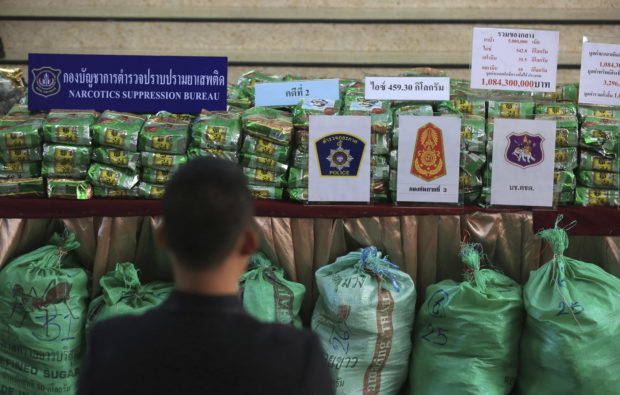BANGKOK – Organized crime syndicates in Southeast Asia are flourishing in the illegal trafficking of drugs, wildlife, counterfeit goods and people, a U.N. report said Thursday.

FILE – In this July 15, 2019, file photo, reporters view packages of seize 459 kilograms (1,012 pounds) of crystal methamphetamine on a table during a press conference at Narcotics Suppression Bureau Bangkok, Thailand. United Nation’s Office on Drugs and Crime, said the cumulative value of the methamphetamine market is more than $60 billion this year. Facilitated by organized crime, the market has expanded since a 2013 study found the accumulated value was $15 billion.(AP Photo/File)
The 179-page report from the United Nation’s Office on Drugs and Crime said that corruption and freer movement of people and goods have facilitated the trafficking, adding that organized crime groups in the region are becoming more mobile as they exploit areas with weak border control and use advanced logistics to move products.
“Southeast Asia has an organized crime problem, and it is time to coalesce around solutions to address the conditions that have allowed illicit businesses to grow, and to secure and cooperate along borders,” said Jeremy Douglas, a regional representative of the UNODC.
Douglas said cumulative value of the methamphetamine market is more than $60 billion this year. Facilitated by organized crime, the market has expanded since a 2013 study found the accumulated value was $15 billion.
He said accessibility and the price of methamphetamine enables the market to thrive.
“The groups that are manufacturing methamphetamine are literally flooding the region for the purpose of building demand, and they’re making it accessible at any price points,” Douglas said. “So you can buy methamphetamine in Bangkok for $2 a pill. It’s basically a price of a quart of milk.”
To tackle the growing drug problem, the report said law enforcement and forensic drug laboratories should be supported to identify shifts in the illicit drug market as organized crime groups diversify chemicals used to manufacture methamphetamine.
It says the region should also adopt measures to prevent trafficking of equipment used in manufacturing illicit drugs.
Human trafficking is another major issue for Southeast Asia and the report said it largely stems from differences in economic development and demand for cheap labor.
The report said “migrants are often subjected to debt bondage, physical violence, and other forms of exploitation” and it noted that there are “gaps in the official data.”
Douglas said governments in Southeast Asia should implement more effective recruitment and migration management systems.
“Governments of the region haven’t properly developed the system to gather the data of the victims of human trafficking, and that needs to be changed,” he said and added that governments should also raise awareness of vulnerable populations at risk of becoming victims of human trafficking.
On the illegal wildlife trade, the report mentions that Laos has become “a major global hub for the trafficking of high value and highly threatened species into other Asian markets, and the country has been identified as the world’s fastest growing ivory market.”
“Governments in Southeast Asia should review their criminal legislation to ensure that law enforcement agencies are fully authorized to follow the financial flows related to wildlife crime and to prosecute money laundering offences,” the report said.
Another thriving trade among crime groups which the report identified as counterfeit goods — including apparel, watches, perfumes, alcohol, electronics and pirated movies and software — makes up a $33.8 to $35.9 billion market.
It urged authorities to seize illicit gains from offenders and said internet platforms such as search engines, online market places, trading platforms and payment service providers should cooperate, and take responsibility for the illicit activities that take place on them. /gsg